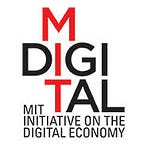What’s the Future of Cryptocurrencies and Web3?
Economists, technologists debate the goals of decentralized societies. Who will control data and toward what end?
By Paula Klein
There’s a lot more to Web3 and cryptocurrencies than most people have considered. Beyond bitcoin or VR headsets for peering into the metaverse, researchers are studying whole new social, financial and commercial networks based on these emerging technologies.
But will the networks lead to decentralized, libertarian utopias or intrusive monopolies? According to the experts, there’s potential for both depending on how these networks are designed and implemented.
At the 2022 MIT Conference on Digital Experimentation (CoDE)on October 21, MIT IDE Director, Sinan Aral, led an insightful fireside chat on the future of blockchain, cryptocurrencies and Web3. A panel of experts — E. Glen Weyl of Microsoft, Hanna Halaburda, of NYU Stern, Neha Narula at the MIT Digital Currency Initiative and Catherine Tucker at MIT Sloan — examined the hype, the dangers and the business opportunities that are unfolding.
Leading the Next Wave
Aral said that collectively, the technologies may lead the next-generation of digital transformation. At the same time, they are experimental and early stage, just as the Internet and digital commerce were in their early days. That makes them ripe for study and research, he said.
“This is the right moment to study Web3, a decentralized society, blockchain and all the technologies that go along with them.”
Economics and computer science are merging in the Web3 sector, Aral said, but the desired end goals and outcomes aren’t the same for everyone. Weyl envisions a decentralized society with open systems and participation. He told Aral that the concept of a dispersed network such as the Internet was “revolutionary” when first proposed; and the idea can still shape the way societies are organized in the future. Dynamic networks can foster democracy, he said, and while the Internet was a first step in that direction, it didn’t go far enough or build all of the needed foundations. Web3 is a “chaotic, weird way to get to that larger goal and to recreate the original vision,” Weyl added, but it is a viable path.
Based on her research at NYU, Halaburda is still skeptical of the benefits of a decentralized society for its own sake. She believes that while Web3 and crypto tools hold the promise of disintermediation and better social welfare, current architecture, culture and economic incentives could lead us “to the same intermediaries as in the past.”
Pointing out the dangers now and rebuilding architectures and regulations to accommodate new technologies can avoid abuses, she said.
Unchecked Power?
Narula and Tucker addressed the paradoxical concerns of security and privacy in networks such as blockchain that are transparent and open by design. Narula sees a backlash taking place against “unchecked power in centralized technologies.” In her view, “decentralization is not the end goal.” Instead, benefits such as fault tolerance, fairness, self-governance and other social good can be the goals, she said, and there are many ways to achieve those aside from technology.
Tucker agreed that there is a tension within the blockchain community because “trust in a decentralized environment is difficult.” Despite more than a decade of development, here’s still a lot of work to be done, panelists agreed.
This year’s CoDE conference attracted more than 350 attendees and spanned two days.
Watch video of the full panel discussion here.
Also listen to the latest episode of Sinan’s podcast, The Digital Insider, where he features the panel discussion.
